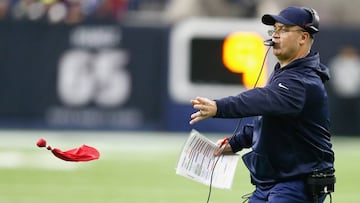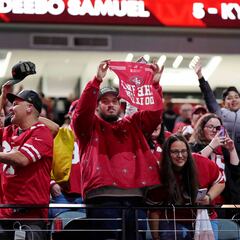Super Bowl challenge rules explained: How many does each team have and when can they use them?
The coach’s challenge system was created to allow teams to contest decisions that may impact the game’s outcome, ensuring fair and accurate officiating.


The Official Playing Rules of the National Football League contains all current rules governing the playing of professional football that are in effect for the 2023 NFL season.
In the new rulebook, the NFL’s coach’s challenge system still ensures fair and accurate officiating, allowing teams to contest specific decisions that may impact the game’s outcome. This system lets head coaches contest certain on-field decisions during the game.
Super Bowl 2024 49ers - Chiefs live online: stats, score, latest updates…
Here’s an overview of how the challenging system works in the NFL:
Types of Plays that Can Be Challenged:
- Scoring plays: Touchdowns, field goals, and extra-point attempts can be challenged.
- Passing plays: Issues related to whether a pass was complete, incomplete, caught, or intercepted can be challenged.
- Runner down by contact: Coaches can challenge if they believe a ball carrier was down by contact before fumbling.
- Out-of-bounds plays: Challenges can address whether a player stepped out of bounds or if a loose ball crossed the sideline.
Initiating a Challenge:
- Coaches are allowed a limited number of challenges per game. They start with two challenges; if both are successful, they are granted a third challenge.
- Challenges must be initiated promptly. Coaches can challenge by throwing a red flag onto the field before the next play begins or by indicating to the officials that they want to challenge.
Review Process:
- Once a challenge is initiated, the referee and the designated replay official review the play using available camera angles and technology.
- The referee communicates with the league’s officiating command center in New York during the review process.
Decision Outcome:
- If the review overturns the original call on the field, the challenging team retains its challenge and is not charged with a timeout.
- If the review confirms the initial ruling, the challenging team loses a timeout, and the coach loses the right to challenge for the remainder of the game.
- In the final two minutes of each half and during overtime, all reviews are initiated by the replay official in the booth, not by a coach’s challenge.
Penalty for Incorrect Challenges:
- If a coach makes an unsuccessful challenge, they lose a timeout. If the team has no timeouts remaining, they incur a 15-yard penalty.
Automatic Reviews:
- The booth automatically reviews Certain plays, including scoring plays and turnovers. Coaches do not need to use a challenge for these reviews.
How does a booth review work in the NFL challenge rules?
Related stories

Tailgate parties not allowed at the 2024 Super Bowl

1995 Halftime Show: who were the performers?
During the final two minutes of each half of a football game, a replay official or NFL replay command center in New York can initiate a replay review if they identify a play that requires further assessment. Additionally, the replay official automatically reviews every scoring play, turnover, and player disqualification.
What aspects of the game can and cannot be reviewed via replay?
The replay can determine possession, field position, out-of-bounds, and disqualifications. Only a few things cannot be reviewed.
According to the NFL rule book, some elements are not eligible for review:
- Whether an erroneous whistle sounded;
- Whether a ball was illegally batted or kicked;
- Whether a passer intentionally grounded a pass;
- Whether an ineligible receiver was downfield before a pass;
- Whether a receiver was illegally contacted;
- The spot of a loose ball crossing the sideline;
- Whether a block was illegal; and
- Any aspect of a play not listed as reviewable in Section 3 of this Rule.
